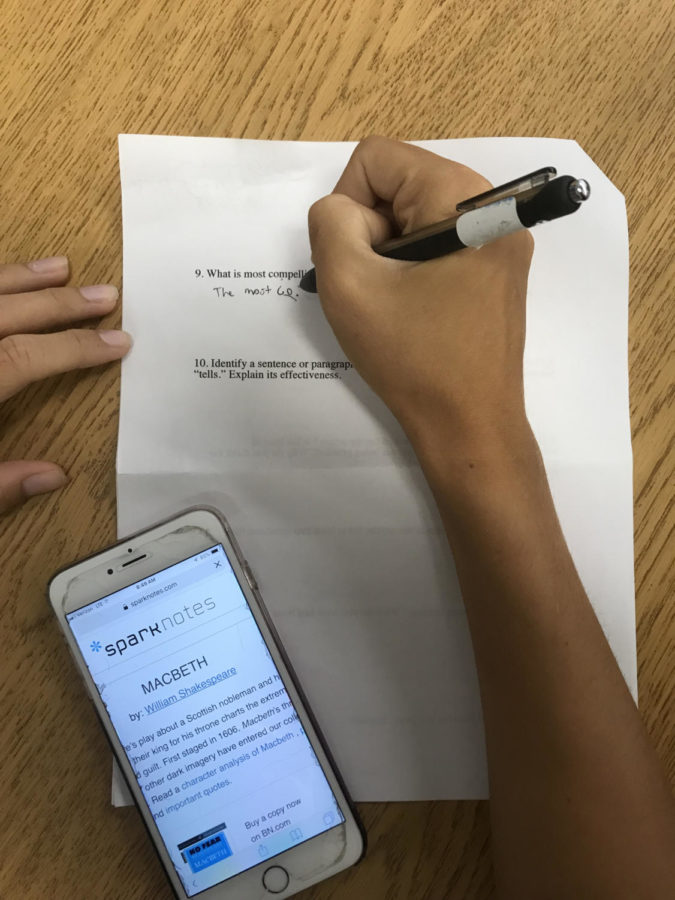Cellphones in Class
A student uses the Sparknotes website to help answer questions on a Macbeth worksheet in class. Photo by Serena Wong 2019.
April 4, 2019
How many times a day do you look at your phone? Like just a quick glance because chances are that it is an incredibly high number. Now plagiarism is a real issue but one thing that people like to talk about is cheating. While in school we are all told to never cheat and to never use our phone or anything else when taking a test or to solve math problems from prior knowledge but tell us what would you use in the actual world if you had to solve a math problem. We believe that as much as it is the teachers choice we don’t consider it cheating because when we are actually out in the world and we have to calculate how many square feet of fence to buy 90% of the time we will probably ask someone how much we need, make multiple trips buying batches at a time, or use our phone to add it all up.
Your phone is your own personal supercomputer so why waste it by not looking up things you don’t understand. That is why we believe that using your phone for tests and similar things shouldn’t be considered cheating.
While it will always be the teacher’s prerogative to consider it cheating or not… but you’re not gonna go to a foreign country and be like “I know I have my phone and all but I’m gonna speak bad broken Spanish because I learned it in high school.” Sure, using skills previously learned will definitely help, but chances are you’re gonna pull your phone out and type what you want to say into a translator. Then you will almost certainly get laughed at because you’re butchering the words.
People are also becoming incredibly dependent on their phones — and that is a topic for another day — but people are not just going to ignore their phones if they don’t understand something. People are so dependent that they will use their phone any chance they get. They want a reason to pull it out and be like “Teach me almighty phone.” Ok maybe they don’t say that but you get the point. If a person gets curious, they will look it up to see what it is.
Most times people don’t have a textbook to teach them certain things. They only use their phone, which is arguably better. If someone wants to look up the history of Hawaii, they’re gonna pull their phone out and look up what happened and then probably fall into the rabbit hole of history. There’s also something different about reading something on your phone compared to reading it in a book, something about it makes it easier to fully invest in what you’re reading and finish what you’re reading.
Of course, there are teachers who say kids don’t learn if the answer is given to them. People are naturally curious so if they like something, they will go out and find the answer. Teachers aren’t wrong for saying “no phones in my class” or variants of those words because it’s their class so if they say no, listen to them.
But saying that kids don’t learn when you’re given the answer we say this: when you’re watching a murder mystery, do you get annoyed when at the end of the episode they tell you who did it, why they did it, and how they did it? No, you go “Ha! I knew it was Timmy.”
People, especially kids, find it harder to learn when they aren’t helped a little. Sure, there are people who just understand it and to those kids, we say “Bravo!” But other kids have a tremendously hard time figuring it out. Sure, the teachers can help the students but they usually teach the harder, more difficult-to-understand method of solving the equation, which can take ten steps to solve when the internet can show that same student an easier two-step way to get the same answer.
There are probably numerous options for solving these problems and the one we really agree with is no phones during tests but, other than that, with the teachers’ permission, of course, you should be able to use your phone.
However, we students have to know whether we should be using our phone or not. If a student has to write an essay and the student is sitting there playing Candy Crush then he should be able to push himself back to work on the essay. Even though that probably won’t happen, we think it’s better that teachers see the betterment of students and if the students really don’t care, then that student can go and fail. That is their fault.
In school, if you use your phone irresponsibly then it’s understandable if you get in trouble or get your phone taken away. But if you use your phone for class work and get stuff done, there shouldn’t be anything holding you back and you should be allowed to use your phone as much as you need.
To fix this, we propose that teachers give students the benefit of the doubt and let students use their phones for research and to help them complete assignments because in real life no one will tell us to put our phones away.
Students definitely like to abuse the phone rule and instead of doing work they like to play on their phones but we propose that everyone try a little hard to complete their work and then have fun after.












